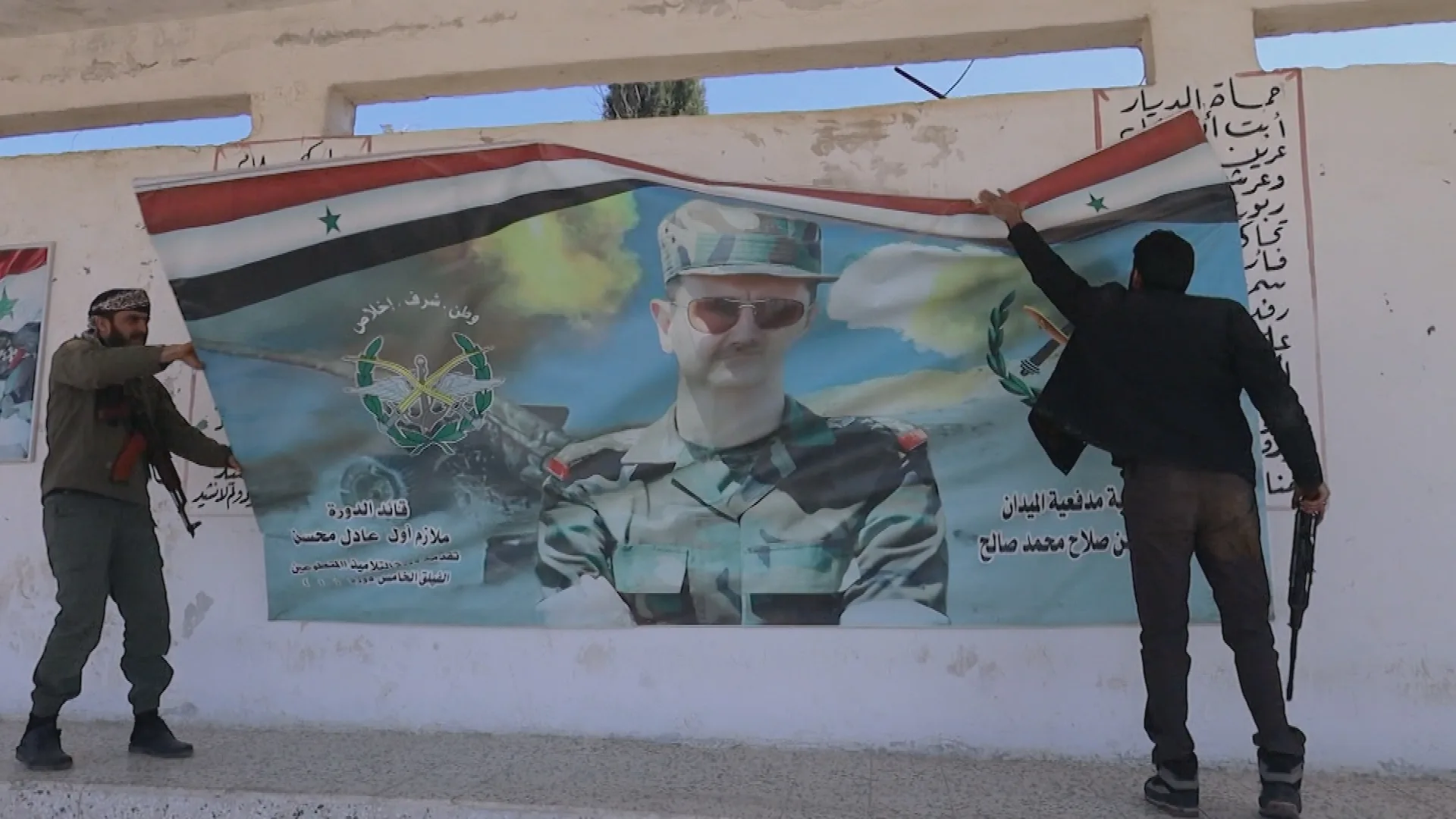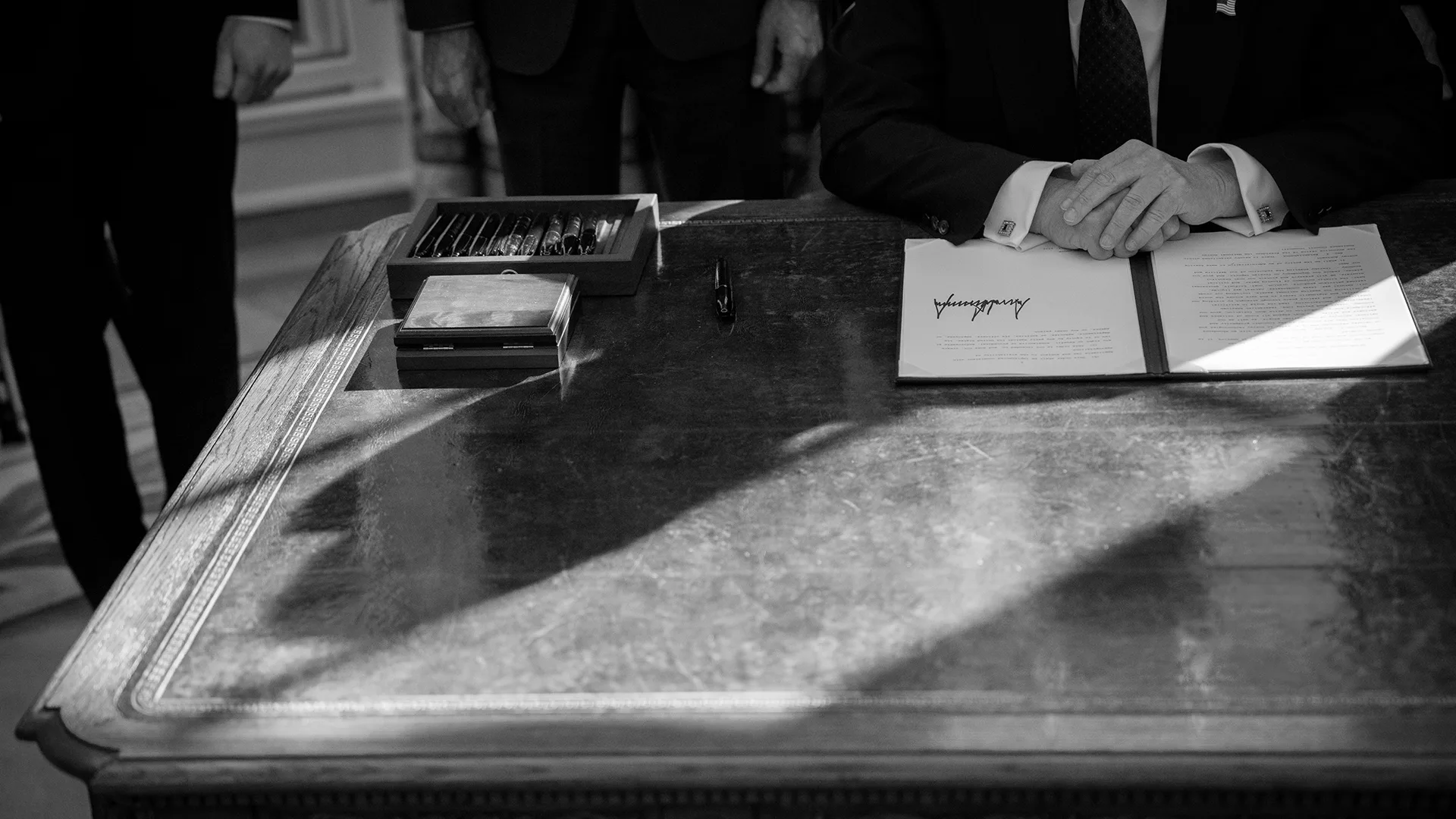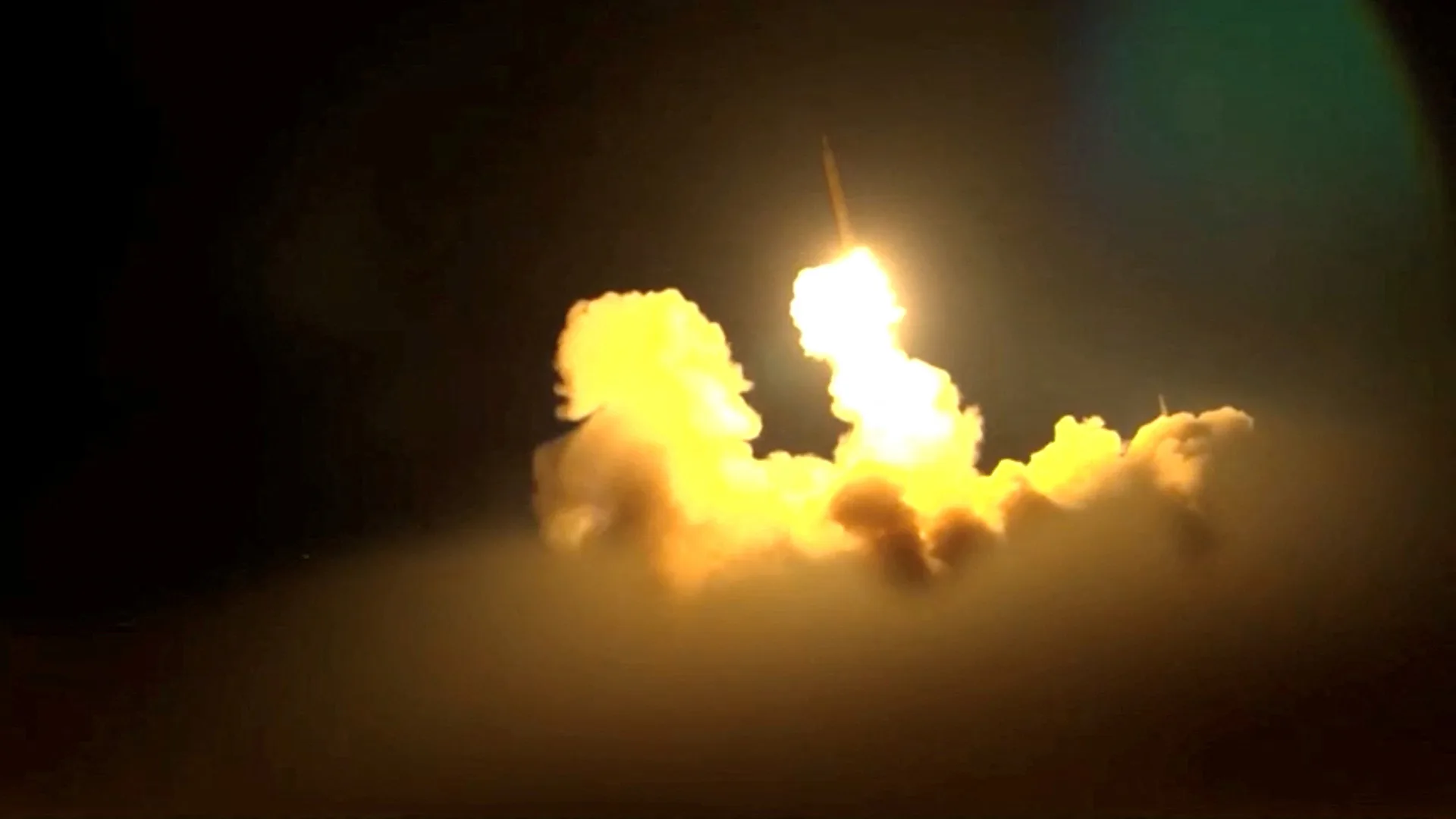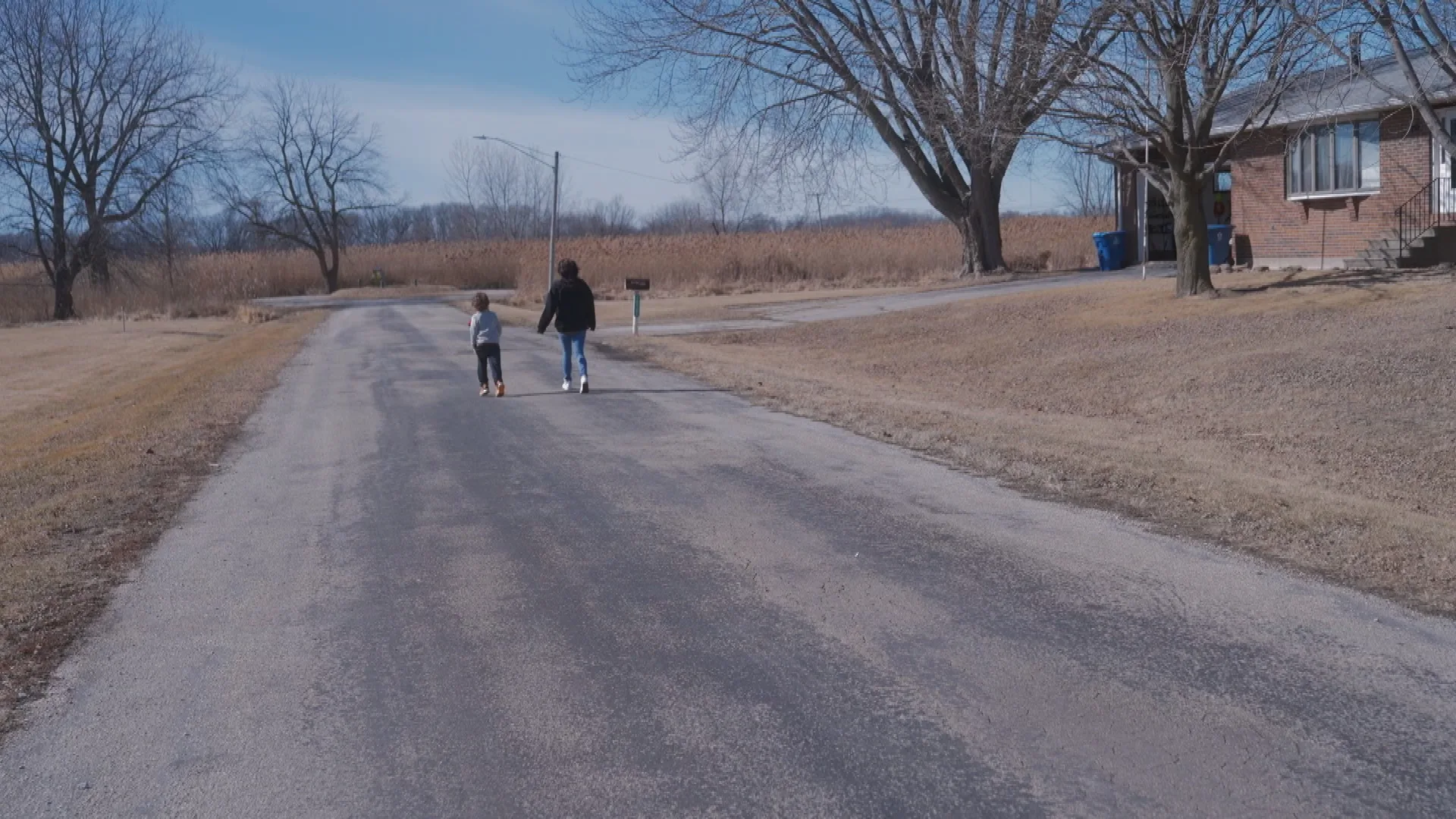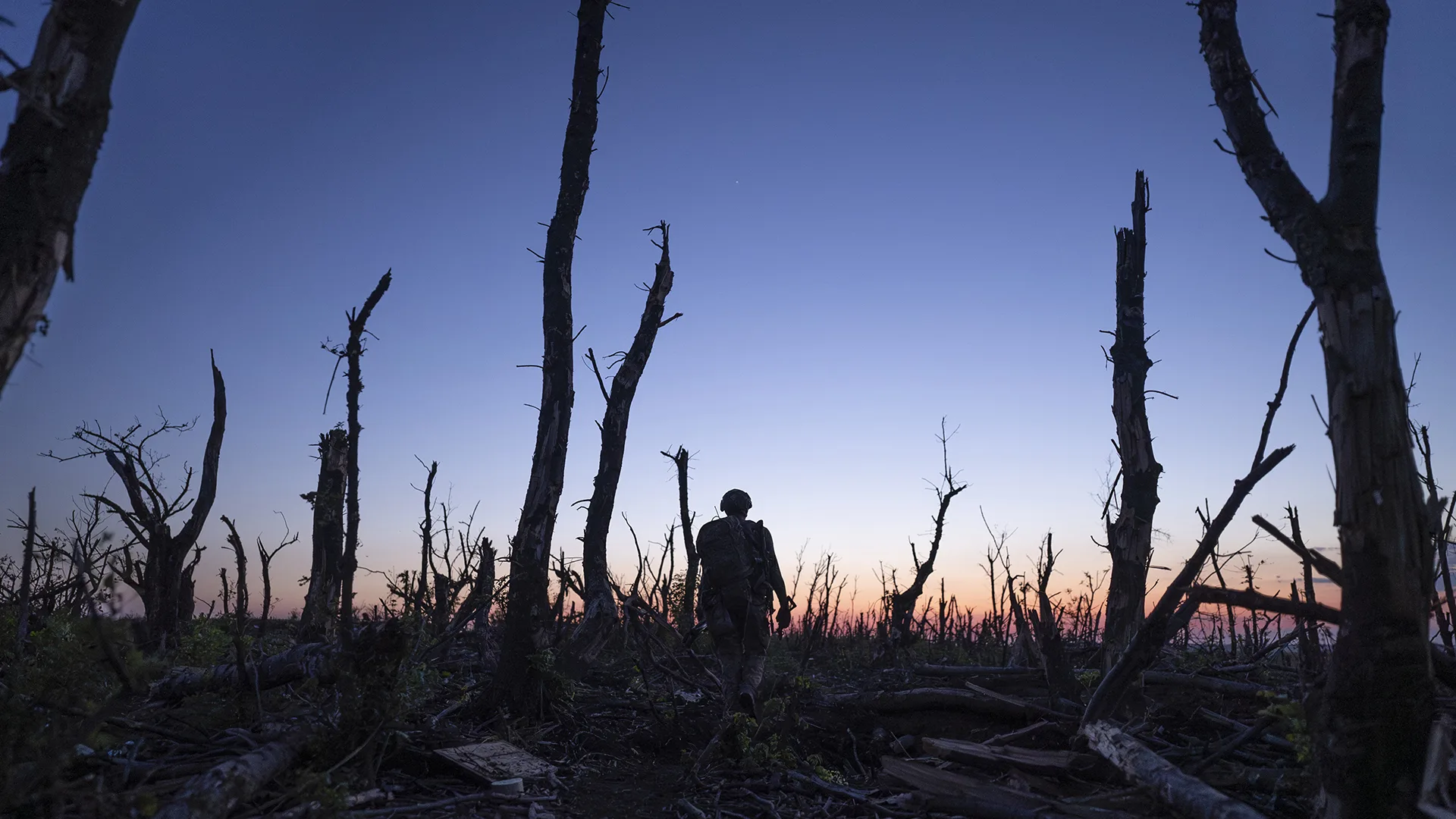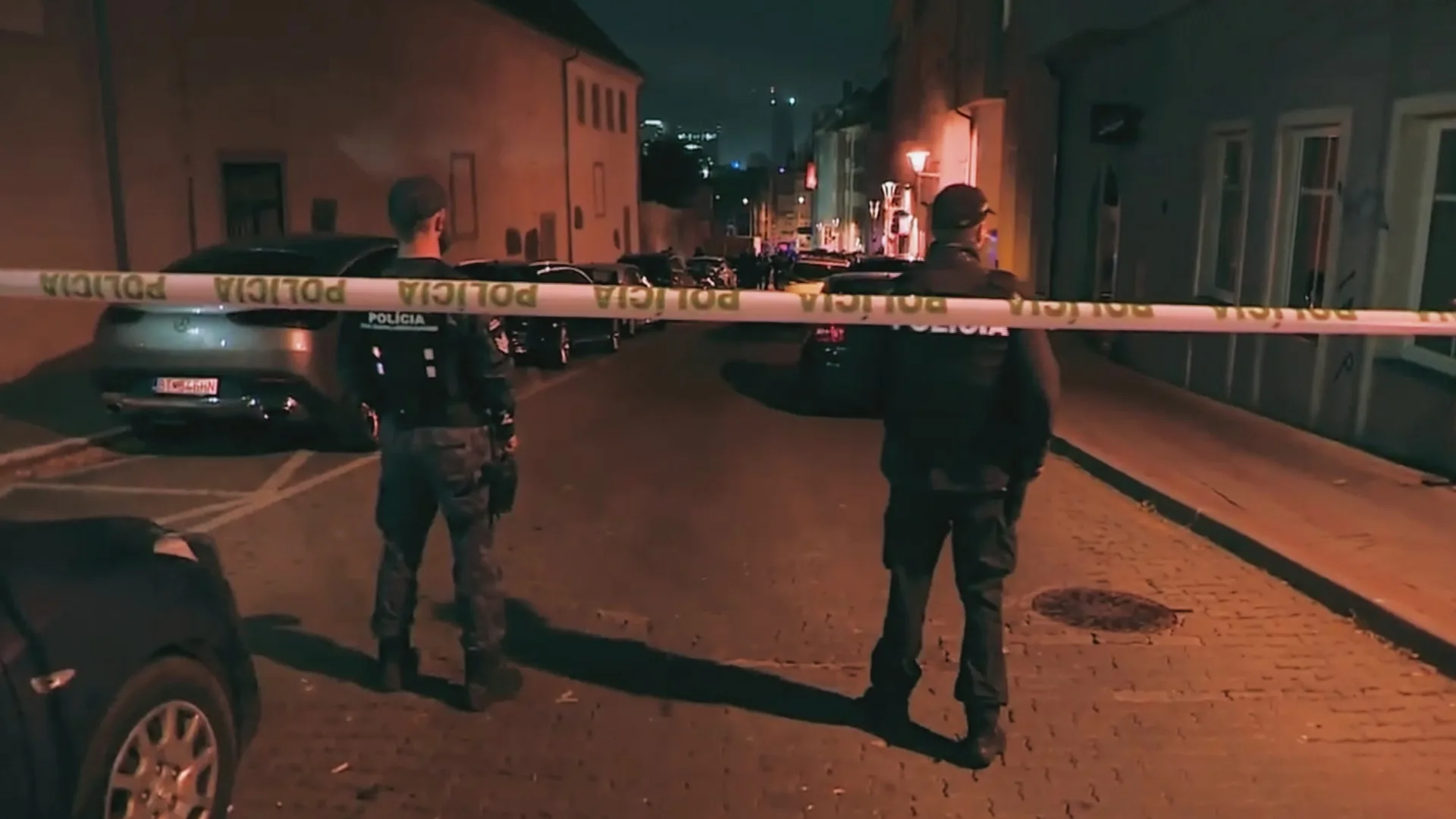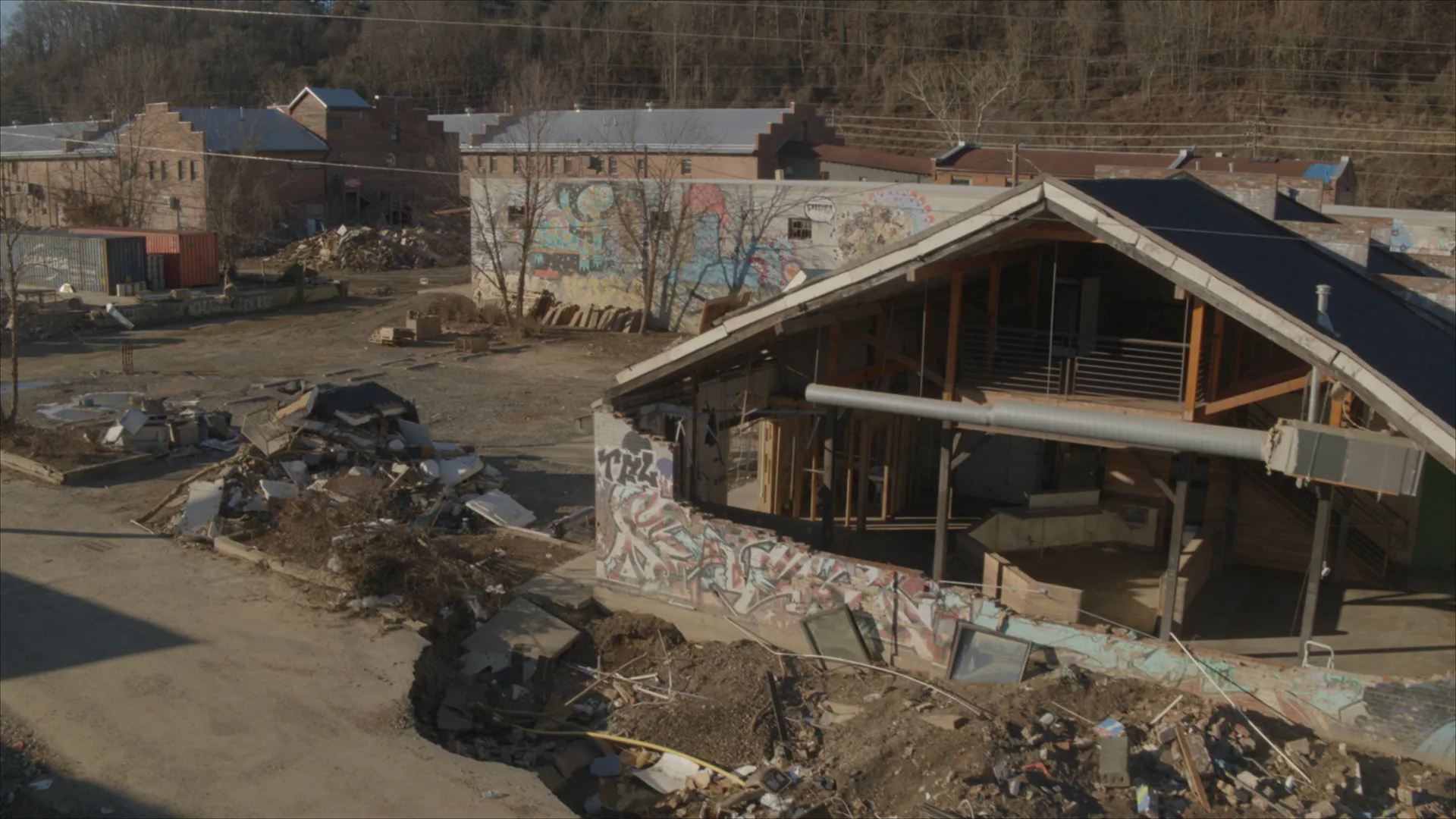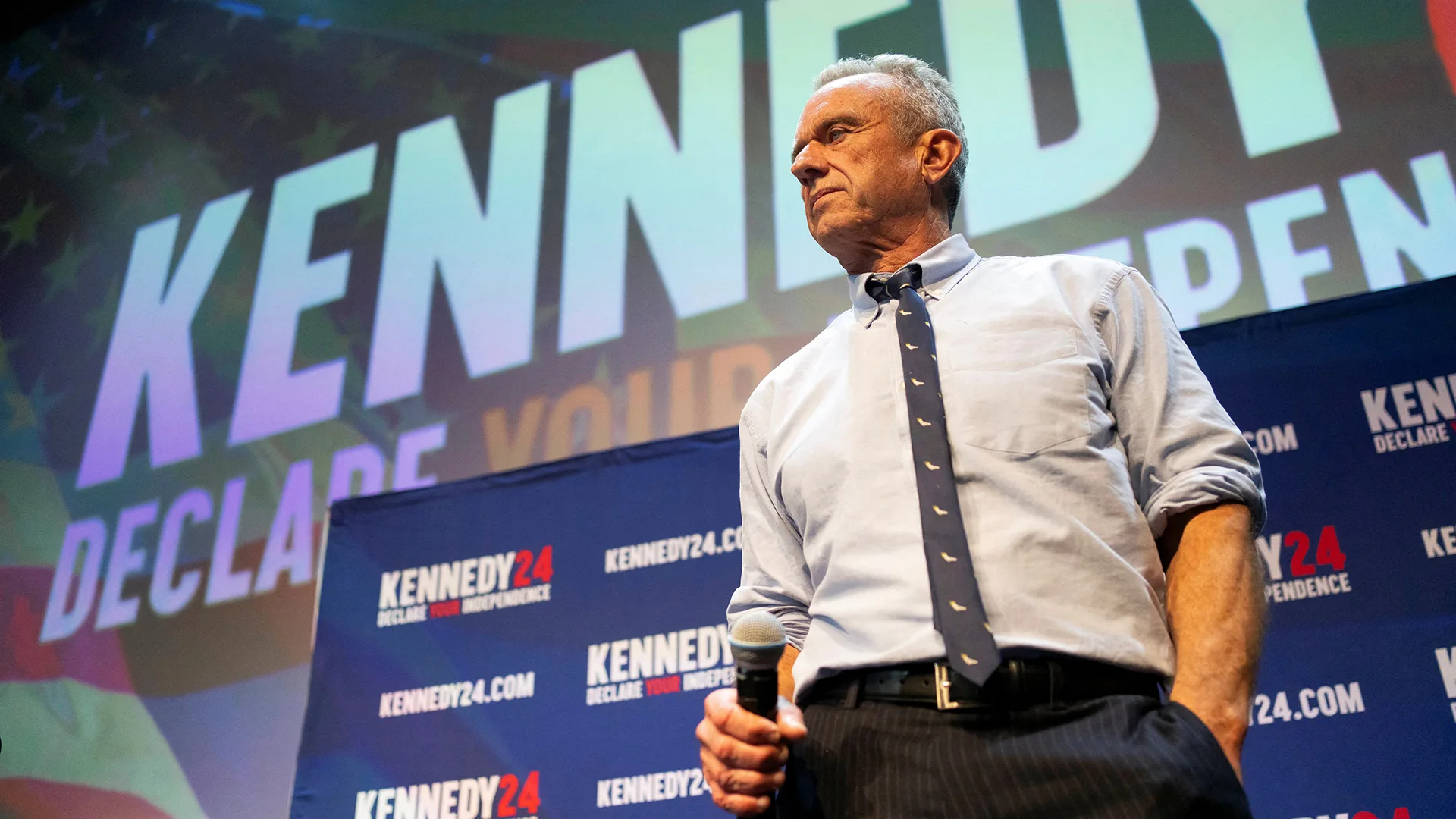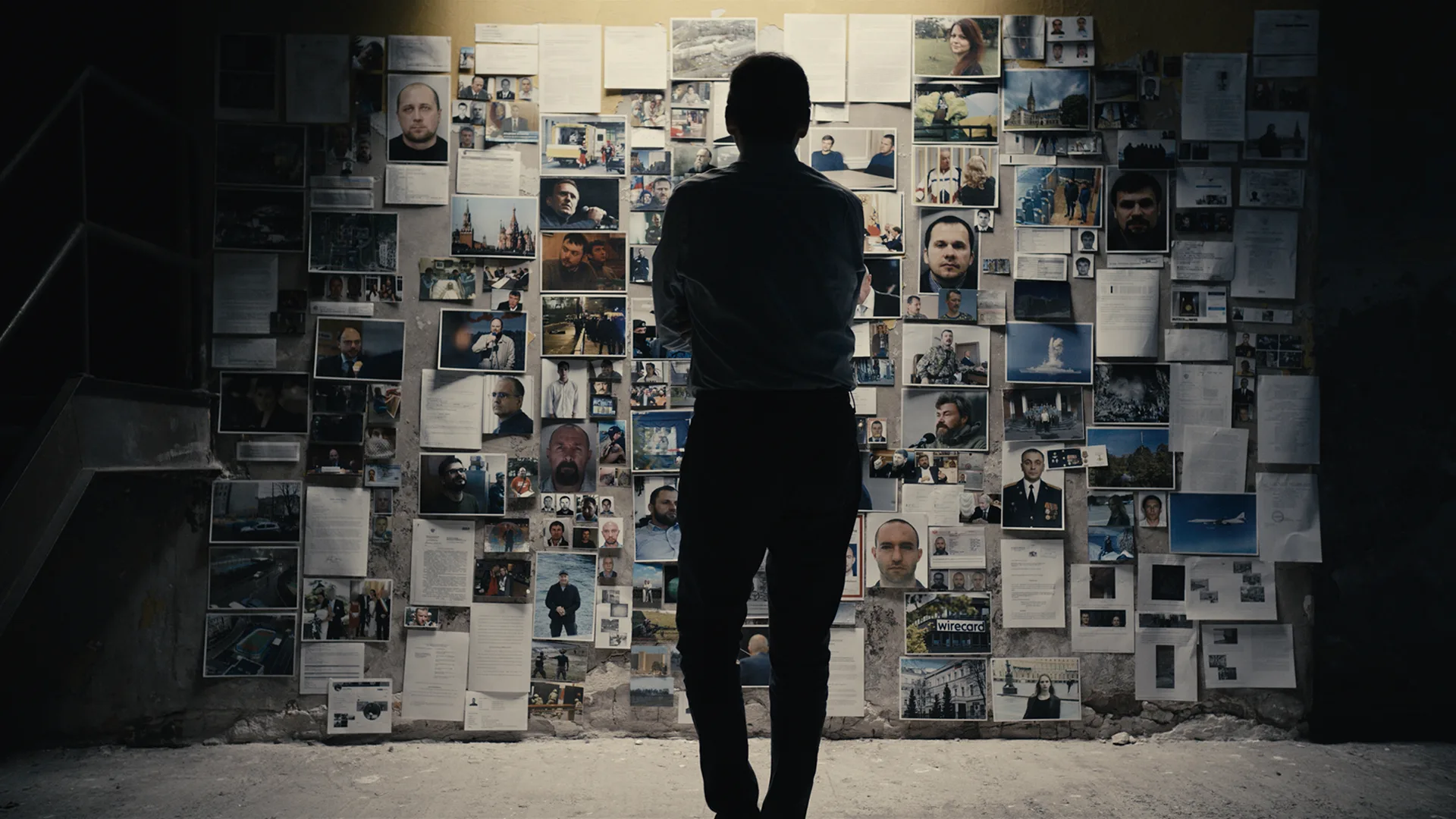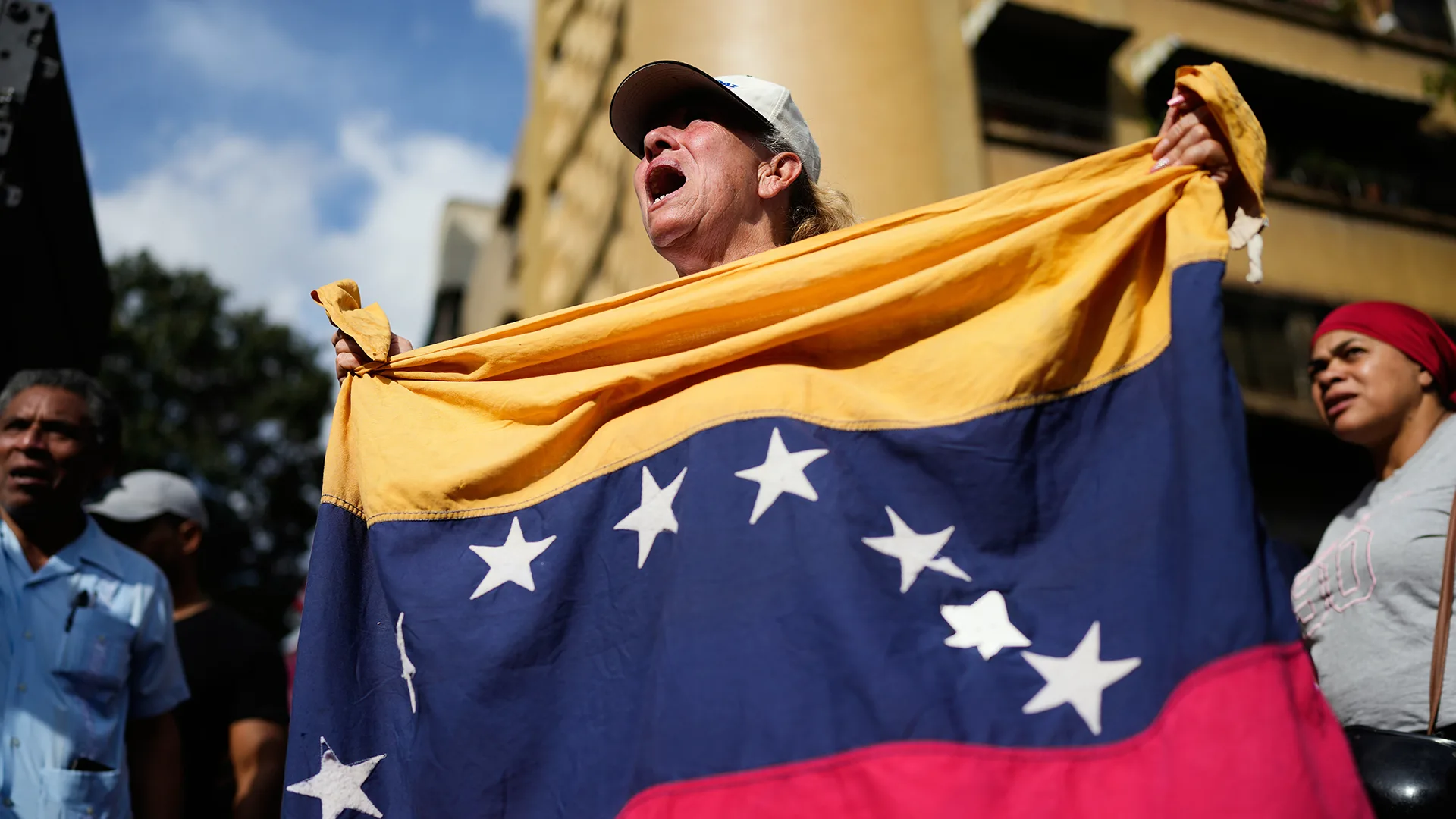A Year of War: Israelis and Palestinians
October 15, 2024
1h 24m
FRONTLINE documents harrowing accounts from those who experienced the Oct. 7 Hamas attack and the ongoing war in Gaza
A Year of War: Israelis and Palestinians
October 15, 2024
1h 24m
Share
FRONTLINE documents harrowing accounts from those who experienced the Oct. 7 Hamas attack and the ongoing war in Gaza. Israelis and Palestinians directly impacted by the conflict talk about death, despair and the continuing trauma.
Directed by
Produced by
Transcript
Credits
Journalistic Standards
Support provided by:
Learn More
Most Watched
The FRONTLINE Newsletter
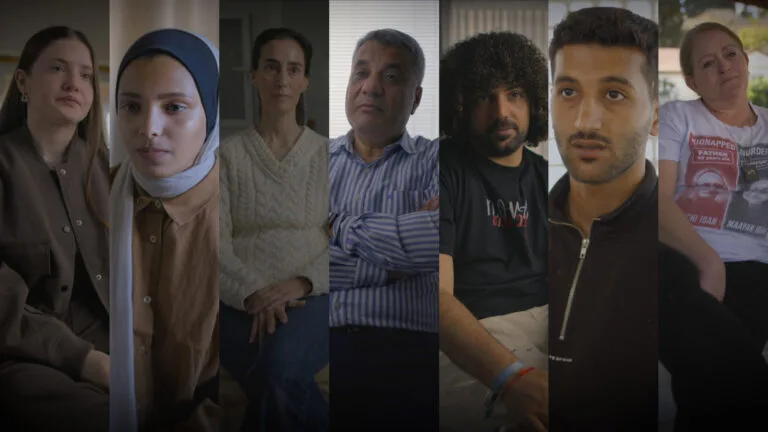
‘A Year of War’ Filmmaker Wanted To ‘Bring Out the Humanity’ of People Caught in the Violence in Israel and Gaza
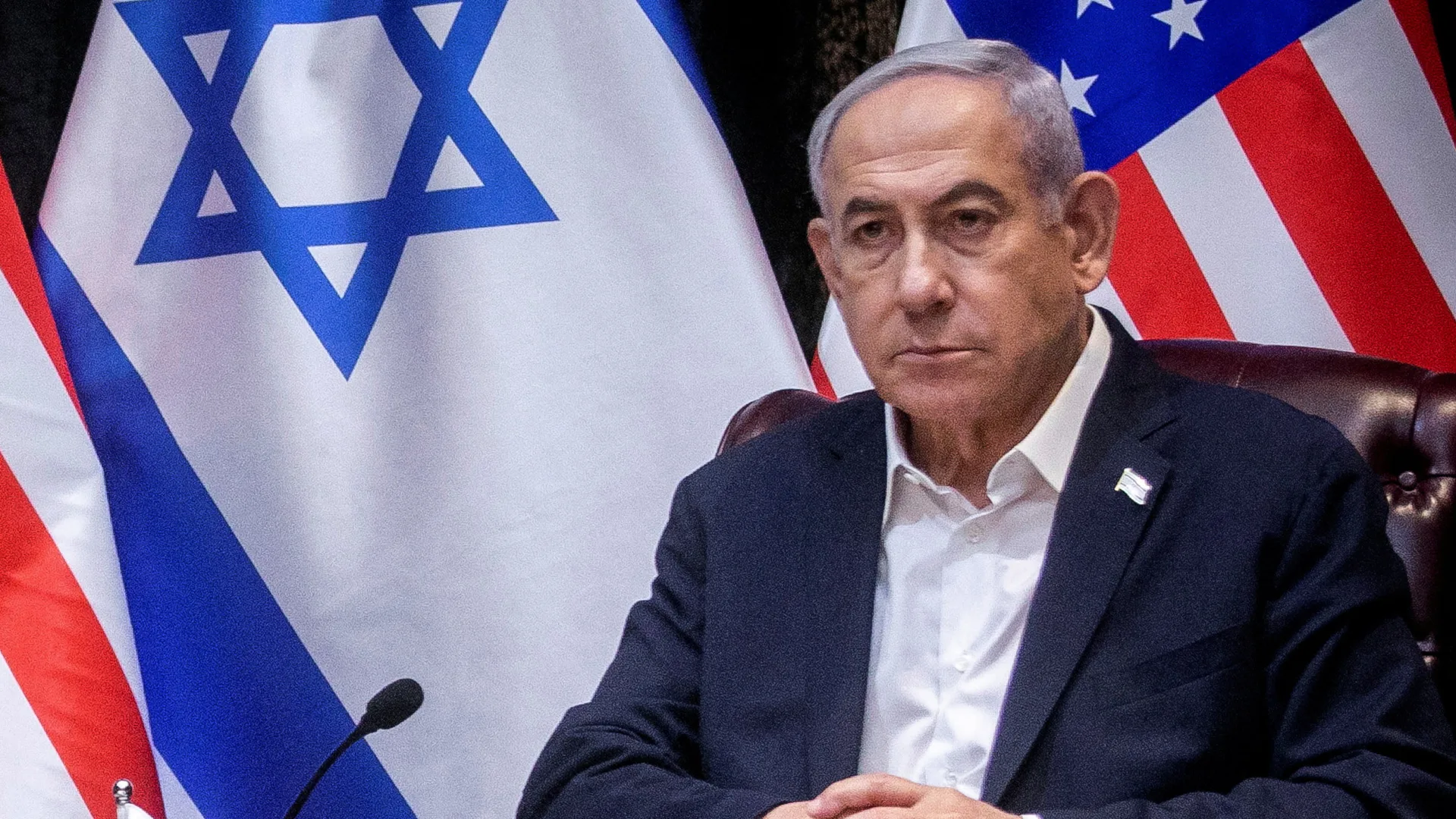
Related Stories
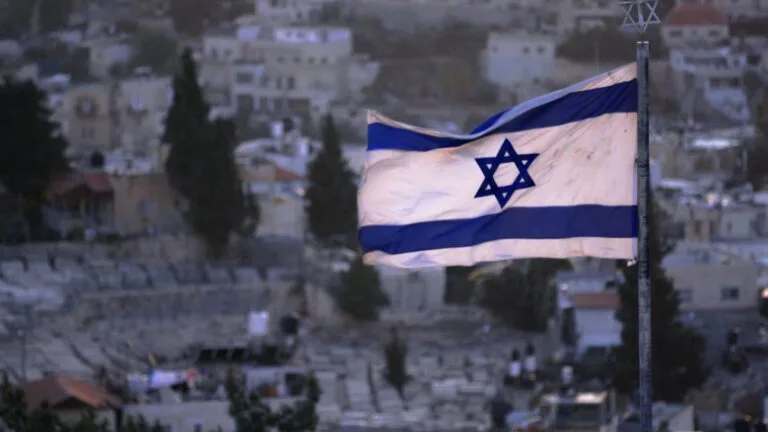
FRONTLINE’s Reporting on the Israeli-Palestinian Conflict
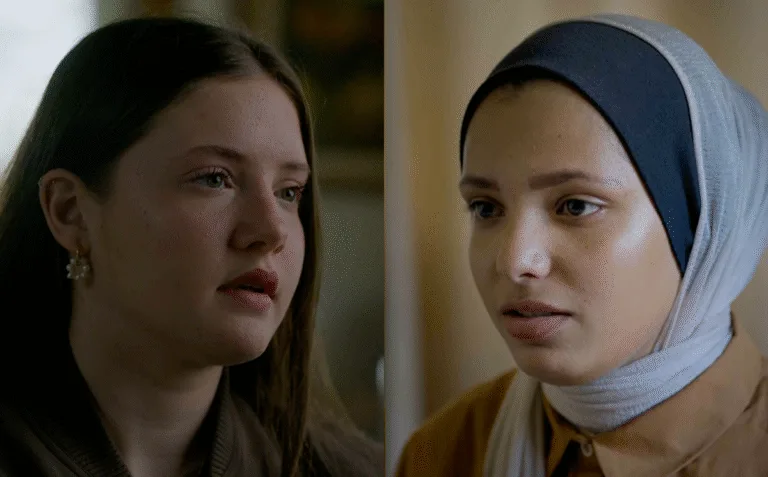
Two Young Women — One Israeli, One Palestinian — Whose Lives Were Devastated by Oct. 7 & the War in Gaza That Followed

‘A Year of War’ Filmmaker Wanted To ‘Bring Out the Humanity’ of People Caught in the Violence in Israel and Gaza
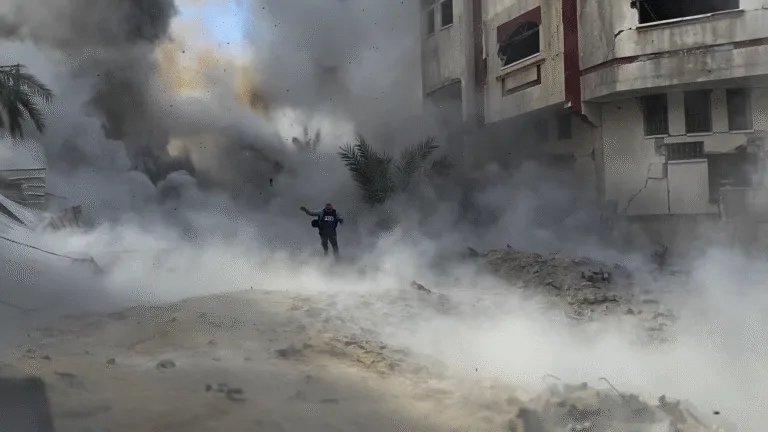
Amid News of a Ceasefire Deal in the Israel-Hamas War in Gaza, Explore the Conflict’s Roots and Ramifications
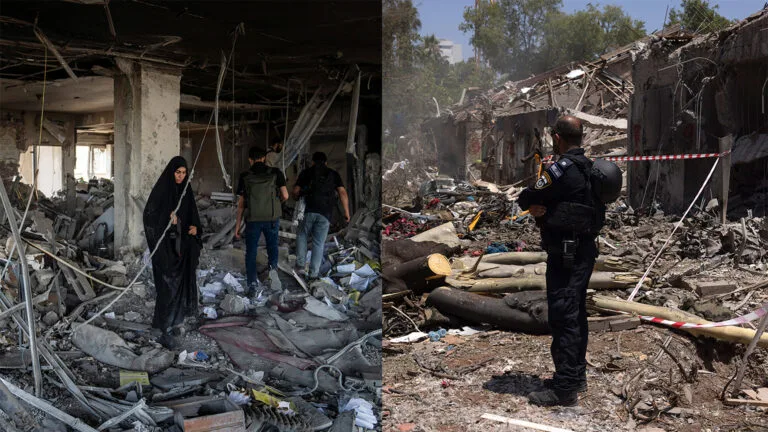
The Iran-Israel Conflict and the U.S. Role: 11 Documentaries to Watch

Netanyahu, America & the Road to War in Gaza
Related Stories

FRONTLINE’s Reporting on the Israeli-Palestinian Conflict

Two Young Women — One Israeli, One Palestinian — Whose Lives Were Devastated by Oct. 7 & the War in Gaza That Followed

‘A Year of War’ Filmmaker Wanted To ‘Bring Out the Humanity’ of People Caught in the Violence in Israel and Gaza

Amid News of a Ceasefire Deal in the Israel-Hamas War in Gaza, Explore the Conflict’s Roots and Ramifications

The Iran-Israel Conflict and the U.S. Role: 11 Documentaries to Watch

Netanyahu, America & the Road to War in Gaza
This program contains graphic imagery which may not be suitable for all audiences. Viewer discretion is advised.
BAT-SHEVA:
[Speaking Hebrew] I’m currently sitting in my house—what’s left of the house. A house that turned into a battlefield.
This film is about Israelis and Palestinians living through a year of unprecedented violence.
IBRAHIM:
[Speaking English] Test, mic, test. In the name of God. How are you? How’s it going? How are things? How’s everything?
VOICE OF INTERVIEWER:
[Speaking Arabic] This interview is for a documentary.
VOICE OF INTERVIEWER:
[Speaking English] There’s no need to rush through the events.
VOICE OF INTERVIEWER:
[Speaking Arabic] We want a detailed testimony.
VOICE OF INTERVIEWER:
[Speaking English] Testimony that will help the audience comprehend what happened Oct. 7.
VOICE OF INTERVIEWER:
[Speaking Arabic] To help the audience understand what happened.
IBRAHIM:
[Speaking Arabic] I’ve never seen anything like this, even in movies. Will we wake up the next day?
Or will we have died? Will we live, or will we die?
This is the story of the Oct. 7 attacks
and the year of bloodshed that followed,
told by people caught in the violence
in Israel and Gaza.
Israel
GALI:
This is nice for me. Perfect weather. Here comes, here goes the sun.
Gali
VOICE OF INTERVIEWER:
Are we good? [Speaking Hebrew] In Hebrew?
GALI:
[Speaking Hebrew] Let’s do it in Hebrew, yes.
My father is a Holocaust survivor. My grandmother is a Holocaust survivor. They made Aliyah [immigrated to Israel] because they were persecuted.
This is the state of Israel, the Jewish state. It’s the place where Jews belong, the last place they’d be persecuted. This is supposed to be the safe haven. Nahal Oz is one of the closest communities to the Gaza border, around 700-800 meters from the fence. The response time we have to a missile attack is 10 seconds or less. That’s life in the shadow of Gaza.
Gaza
Before October 7th 2023
IBRAHIM:
[Speaking Arabic] I was born in Gaza. It’s my country, life, family, people. It’s all in Gaza. It means so much to me, my motherland. I’ve travelled to many countries but only feel comfortable when I’m here and breathing Gaza’s air. [Laughs] Do you know who that is? That’s Mustafa. Our Mustafa.
Ibrahim
IBRAHIM:
[Speaking Arabic] I’ll talk to him.
Look at us.
I have a big family. I have six sisters, five are married.
Who do you love?
CROWD OF CHILDREN:
[Speaking Arabic] You.
IBRAHIM:
[Speaking Arabic] Dive, everybody.
My nephews and nieces call me the fun uncle. I always create a happy atmosphere, play and make them laugh.
The best thing in life is spending time with your brother’s and sister’s children. It’s better than anything else in the world.
My family comes from a small town called Hulayqat near Isdud [now in Israel].
It’s Zeina’s turn. Come here, Zeina.
My grandmother told me she was 6 years old when they were displaced from their land in 1948. They were displaced and had to seek a new life. My grandmother told me her father took her and the whole family to Jabaliya camp in Gaza. But when he went back to collect their belongings, he never returned. Nobody knows his fate.
All the children in today’s generation struggle, and they’re raised with the idea Israel is an occupier and usurper. This is the reality we see.
Israel’s military occupied Gaza from 1967 to 2005.
After Israel withdrew, the Palestinian militant group Hamas took control.
Since then, Hamas has fired tens of thousands of rockets at Israel.
Israel has repeatedly bombed and blockaded Gaza.
IBRAHIM:
[Speaking Arabic] We’ve been at war since I was born. You’re born into a state of war. As a Gazan, you live in a state of war throughout your life. We’ve had a siege, bombings, death. But there was also joy, life, happiness. We’ve tried to live our lives despite all the challenges.
October 6th
2023
MA’YAAN:
[Speaking Hebrew] I’m taking a video of him. [Laughs]
TSACHI:
[Speaking Hebrew] What?
MA’YAAN:
[Speaking Hebrew] Video.
GALI:
[Speaking Hebrew] On the evening of Oct. 6 we were at home. [My husband] Tsachi made beef in the oven, wine, music, a typical Idan family night.
He doesn’t know what he’s missing.
Ma’ayan joined us. Ma’ayan, she’s our first born. A magical girl, the most easygoing in the world. Everything went smoothly with her.
Shahar is 10 years old. A sweetie, he has one dimple. He’s magical, my baby boy.
Yael, 12 years old, celebrated [her Bat Mitzvah] in February. She can basically live on sushi.
Then Yael joined us, and there was family banter, as normal as it gets in our beautiful corner of Nahal Oz, sitting in the pergola. We went to bed late. I was saying to Tsachi how much fun it is to have such a wonderful family. And that’s it.
6:29 a.m.
October 7th
2023
MALE VOICE [on radio]:
[Speaking Arabic] Rockets are being fired by the resistance toward the occupied territories.
MALE NEWSREADER:
We’re following major, major breaking news right now. Thousands of rockets have been fired from the Gaza Strip into Israel.
MALE NEWSREADER:
An unprecedented early morning series of attacks on Israel.
IBRAHIM:
[Speaking Arabic] I woke at 6:30 a.m. to the sound of explosions and rockets. It felt like doomsday. My brother came to my room and asked, what’s happening? I asked him the same thing. Nobody knew anything.
FEMALE NEWSREADER:
The Palestinian terrorist group Hamas launched an offensive by air, sea and land at sunrise.
MALE NEWSREADER:
—a group committed to the destruction of Israel and designated a terror organization by many Western governments.
HAMAS FIGHTER:
[Speaking Arabic] Conquest, in the name of God.
Shoam
SHOAM:
[Speaking Hebrew] How surreal. How mad. [Speaking English] You ready?
[Speaking Hebrew] I’ve still got the wristband on. People ask me, “Have you been to a party?” It’s always there to remind me.
Nova Music Festival
Three miles from Gaza
SHOAM:
[Speaking Hebrew] My friend was going through a difficult time. I said, “All right, I’ll buy a ticket.” I’ll be with him, partying, and it’ll be fun. I’ll surprise him there. The party started. We were dancing, having a good time until 6:30 a.m. on the dot.
It started with missiles. They immediately turned the music off. We started hearing the gunshots, so we ran under the stage.
Bat-Sheva
BAT-SHEVA:
[Speaking Hebrew] I’m Ohad’s partner. I’m a mother of three children—Eitan, Yael and a baby girl who’s 2 years old. We’ve been living in Nir Oz for 11 years.
Kibbutz Nir Oz
Security camera footage
BAT-SHEVA:
[Speaking Hebrew] In the morning, we woke up to the Code Red sirens. The sirens were already very different, very strange, because they sounded one after another. I rushed to take the baby from her room, and we went to the safe room, as we usually do. We tried to close the door but it wouldn’t close.
Kibbutz Nir Oz
Security camera footage
BAT-SHEVA:
[Speaking Hebrew] We started getting messages on the WhatsApp group. One read that there are terrorists in the kibbutz dressed as soldiers. Ohad understood how serious the situation was and left the safe room. Basically, he decided to go outside to protect us. He continues messaging friends and kept shouting that he loves us.
Kibbutz Nir Oz
Security camera footage
BAT-SHEVA:
[Speaking Hebrew]
We started hearing yelling in Arabic outside the house. They keep shooting at us from outside. They break into our house, breaking and smashing everything. They shoot Ohad. He screamed in pain. Four terrorists enter [the safe room], yelling at us in Arabic, “I shoot.” He left us no choice, we had to come out. When we left the safe room we saw Ohad sitting wounded, bleeding. I asked Ohad, “What do they want?” He said, “They’re taking us to Gaza.”
HAMAS FIGHTER [on radio]:
[Speaking Arabic] We’ve captured four hostages, children and adults. I’m sweeping the kibbutz.
Hamas footage
HAMAS FIGHTER:
[Speaking Arabic] Have you finished checking these buildings? Come on, search all of them. Where are they?
GALI:
[Speaking Hebrew] Then we received a message from security to lock the safe room’s doors and windows and to be quiet.
HAMAS FIGHTER:
[Speaking Arabic] God is the greatest. [Speaking English] Anybody here?
GALI:
[Speaking Hebrew] From this moment we’re simply terrified, absolute terror.
Gali’s house
HAMAS FIGHTER:
[Speaking English] Hey, anybody here? Anybody here? Anybody here?
HAMAS FIGHTER:
[Speaking Arabic] Come on, go, go. Secure this area.
HAMAS FIGHTER:
[Speaking English] Anybody here?
GALI:
[Speaking Hebrew] We hear someone walking on broken glass in the house. I’m trying to think what can we do. I grab Yael.
HAMAS FIGHTER:
[Speaking Arabic] The air conditioner is on, people are here.
GALI:
[Speaking Hebrew] Tsachi grabs the door handle to try to stop it from opening.
HAMAS FIGHTER:
[Speaking English] Open the door!
GALI:
[Speaking Hebrew] Ma’ayan jumped in front of the door to help Tsachi and they shoot at the door.
They come in and turn on the light. [Cries] I see Tsachi sitting, his hands covered in blood. He says, “No, no, no, Gali, help her.” I move my hands slowly over her [Ma’ayan’s] body to check where she was injured because I didn’t understand. And I see when I reach her head she has her eyes open. And I go like this and I feel the injury, and it’s fatal. In that moment, I say to Tsachi, she’s gone. No more.
Hamas footage
HAMAS FIGHTER:
[Speaking Arabic] Come here, get out. Put your hands up. Come out.
Nova Festival
SHOAM:
[Speaking Hebrew] We’re under the stage. Then someone who’s simply an angel ran toward us, screaming, “Get out from under the stage!” We ran around the stage. We were running, about 20 to 40 people. I look back and see them standing in a line. We were like sitting ducks in a shooting exercise. They were simply standing and shooting non-stop.
I turned my head while I ran, running for my life. The earth is trembling. The stones are bouncing. I’m looking around and I’m telling myself that I need to hide.
HAMAS FIGHTER:
[Speaking English] Anyone here? Anyone here? Hands up. Anyone here?
HAMAS FIGHTER:
[Speaking Arabic] Brothers, we don’t want hostages we’ve got a lot already. Kill.
HAMAS FIGHTER:
[Speaking English] Anyone here?
SHOAM:
[Speaking Hebrew] In the military, I learned you need to hide inside the bush. You have to be in the heart of the bush so no one sees you. I told them, “Be quiet, be quiet everyone. Come here, come inside.” Then the terrorists came from two directions, shooting like crazy at the bush as they’d spotted people running in.
It’s hard to explain what it means to come to terms with death. I’ve finished the chapter, and now the screen is about to turn off, like in the movies. Crazy.
GALI:
[Speaking Hebrew] Ma’ayan is still lying in the safe room. One of them asked me, “Is this your phone?” I say, “Yes.” He says, “I’ll do a livestream.”
HAMAS FIGHTER:
[Speaking English] Come with me, come with me.
SHAHAR:
[Speaking Hebrew] What do you want? What are they doing? What? What are they doing?
HAMAS FIGHTER:
[Speaking English] Come with me.
HAMAS FIGHTER:
[Speaking Arabic] Keep filming them, keep filming them.
GALI:
[Speaking Hebrew] We’re sitting on the floor. Tsachi, me, Yael and Shahar. This is all happening as AK-47s are pointed at me and the children. The children ask Tsachi if he’s injured, because his legs, his knees and his hands are covered with blood and he’s pale. I tell them, “It’s not Dad’s blood, it’s Ma’ayan’s.”
SHAHAR:
[Speaking Hebrew] [Cries] Why did Ma’ayan need to come and help you?
TSACHI:
[Speaking Hebrew] I don’t know, sweetie. That’s what she wanted. She was afraid they’d break in, so she came to help.
GALI:
[Speaking Hebrew] The children are crying. They don’t understand, and they are shouting.
SHAHAR:
[Speaking English] No, no, no! It’s my sister!
YAEL:
[Speaking English] My sister died.
HAMAS FIGHTER:
[Speaking English] Relax, relax.
GALI:
[Speaking Hebrew] It’s OK, it’s OK.
HAMAS FIGHTER:
[Speaking English] Left to God.
YAEL:
[Speaking English] What?
GALI:
[Speaking Hebrew] They say that she went up to the sky.
SHAHAR:
[Speaking Hebrew] [Cries] To the sky.
GALI:
[Speaking Hebrew] I was thinking, when will they kill us, when will they shoot us? What will they do with us? What won’t they do with us?
HAMAS FIGHTER:
[Speaking Arabic] Oh, God, grant victory to Islam and Muslims.
SHAHAR:
[Speaking Hebrew] Are they killing us? Are they killing us?
TSACHI:
[Speaking Hebrew] No. No, they’re not killing us. They’re not killing us.
GALI:
[Speaking Hebrew] Tsachi is still in shock. The strongest person I know in the world is just broken, crushed.
HAMAS FIGHTER:
[Speaking Arabic] Glory be to God. Even enemies look after children.
SHAHAR:
[Speaking Hebrew] Do you think she’s dead? Dad, are you all right? [Cries]
GALI:
[Speaking Hebrew] At one point, they tell Tsachi to get up. Zip ties are taken out. I look at Tsachi and he tells me, “I love you, sweetheart.” I tell him, “I love you a lot. Don’t do anything stupid, we need you, love.”
Gali’s husband, Tsachi, was taken to Gaza.
Gaza
IBRAHIM:
[Speaking Arabic] I grabbed my phone and started to film people celebrating. The only thing that was clear was that Hamas entered Israel. At one point, almost all of Gaza’s residents were happy on Oct. 7. Like everyone in Gaza, I live under siege, continual wars and invasions. We live a life of humiliation. Everything is hard. It was natural for people to be happy. But in my head I knew we were heading toward the abyss. I’m against anyone being harmed, whether they be Israeli, Palestinian or anyone. I’m against bloodshed.
AGAM:
[Speaking Hebrew] I used to live in Kibbutz Kfar Aza, just two kilometers [1.2 miles] from Gaza. On Oct. 7, I was 17 years old. We begin to hear gunshots and fighting outside. They entered very quietly. We suddenly heard screams of “Al Yahud, al Yahud [Jews, Jews].” They entered the safe room and I heard my father shouting, “No, no, no!” And they shot him right away.
Agam
AGAM:
[Speaking Hebrew] I can only remember a sort of sigh of relief as I was about to die. After five hours of being scared to death, it’s finally happening. I certainly didn’t think they would kidnap us. It didn’t cross my mind.
Agam, her mother and two brothers were taken hostage.
Her father and sister were shot dead.
AGAM:
[Speaking Hebrew] We arrived in Gaza. My mother and my little brothers, Gal and Tal, are in the car. There were two terrorists in the front seats. I remember turning my head and my mother saw an ambulance. She gestures, begging the driver for help, but he shakes his head, signaling he can’t help. Everyone’s celebrating, taking pictures. Everyone’s happy. The terrorist opens the car window, playing music. The terrorist cheers and shouts.
MALE PALESTINIAN:
[Speaking Arabic] [Cries] God is the greatest! God is the greatest!
AGAM:
[Speaking Hebrew] It happened with such speed and ease. By midday, we’re already in Gaza. By then, they’d already murdered my father and sister, and now we’re in a tunnel. We hunched over and hugged the wall. It was stifling.
Kibbutz Nir Oz
Security camera footage
BAT-SHEVA:
[Speaking Hebrew] The entire kibbutz is on fire. The views were incomprehensible. I was scanning the street to see if it was possible to escape. But it was impossible, the street was swarming with terrorists. They put us on motorbikes, Eitan on the one in front, me and the two girls on the one behind, and we begin riding through the kibbutz.
Kibbutz Nir Oz
Security camera footage
BAT-SHEVA:
[Speaking Hebrew] Then two tanks arrived, creating total mayhem. People began to run and escape. Our motorbike falls over and I can no longer see Eitan’s motorbike. Eitan disappears from me. His motorbike goes on. I took advantage of the cloud of dust. I grabbed Yael. The baby was in my arms the whole time, she’s tiny. I grabbed Yael and we ran away.
Kibbutz Nir Oz
Security camera footage
BAT-SHEVA:
[Speaking Hebrew] Throughout the escape I was torn apart because Eitan wasn’t with me. Eitan has disappeared and there’s nothing I can do. It’s impossible to comprehend. It’s the worst thing that can happen to a mother.
Eitan and his wounded father, Ohad, were taken to Gaza.
Around 1,200 people were killed in the Oct. 7 attacks and over 5,000 injured, according to the Israeli government.
251 hostages were taken to Gaza.
SHOAM:
[Speaking Hebrew] When someone ferociously attacks you in your country you feel this enormous pain which affects every household.
GALI:
[Speaking Hebrew] We experienced an attempt to exterminate the Jewish people. I thought there was no way human beings could do such a thing. I thought I could forgive. I cannot forgive. I will never forgive.
Gaza
MOHAMED EL-RAN, Head of Surgery, Indonesian Hospital, Northern Gaza:
[Speaking Arabic] We always say we are Gaza the Phoenix. Whatever calamity befalls us, we’ll rise again, removing the dust and debris. The regeneration happens quickly.
My father is Gazan and my mother is a refugee. I was born in 1966.
Everyone in the Arab world admires doctors—doctors or engineers. In the Gaza Strip, because of uprisings and invasions, we needed surgeons, as there were so few of them.
The first war we lived through in Gaza after 1967 was in 2008, then 2012, then 2014, then 2021, then May 2023, then the war of the 7th, Oct. 7.
FEMALE NEWSREADER:
Six thousand bombs have hit targets in the Gaza area as Israeli forces aim to eradicate the Hamas militant group in the wake of Saturday’s attacks.
FEMALE NEWSREADER:
Netanyahu gave a surprise address telling the Israeli public that, quote, “Our enemies have only started paying the price.”
MALE PALESTINIAN:
[Speaking Arabic] Stretcher, stretcher.
VOICE OF INTERVIEWER:
[Speaking English] Record.
GHADA:
[Speaking Arabic] Here is the microphone and the device. Oh, OK. Sounds good.
Ghada
GHADA:
[Speaking Arabic] I’ve forgotten who Ghada was and how I used to live. If I want to remind myself, I go back to my phone and look at photos. My dream was to start a solar energy company. To be honest, my dream now is for my family and I to make it out alive.
The Hamas attack took everyone by surprise. The strength with which they entered was a surprise to us, too, and a surprise to the rest of the world. We are in a besieged strip of land. How do they have the power? How do they have the capabilities? The first thing I said to my family was this war will not be simple.
With Hamas, we’re not able to voice our opinions. Hamas does what it wants. As Palestinians we don’t have freedom to express our views about Hamas or anything that happens.
FEMALE NEWSREADER:
Israeli Defense Forces dropped leaflets across northern Gaza. They read in Arabic, “Gaza City has turned into a battlefield. You have to leave your homes immediately and head south.”
GHADA:
[Speaking Arabic] We didn’t know which road would be safe for us to take. Then they struck a place near where we were standing. We didn’t know what to do.
MALE NEWSREADER:
Jabaliya, the largest refugee camp in the Strip, is one of the most densely populated places on earth.
FEMALE NEWSREADER:
Israel says that Hamas is hiding its leaders and infrastructure there and using civilians as shields.
MALE NEWSREADER:
Israel’s furious strikes on Gaza are laying waste to entire neighborhoods. The northern Jabaliya refugee camp is now a hellscape.
IBRAHIM:
[Speaking Arabic] For those who don’t understand the idea of the camp, the camp is made up of small
streets with houses near each other. When a rocket lands on an area, four or five homes are destroyed and people are crushed underneath. Imagine if they bomb this house, the other house will be gone, too.
My job is photographing products and things that bring joy. I needed to go and document what was happening, because no one else was able to.
Come out, come out, don’t be afraid. Don’t be afraid. Hold onto her. A densely populated residential area. Don’t be afraid, get out. Take the children with you.
Bombing, a new bombing.
I saw smoke rising from the direction of my sister’s house. I started running toward the strike.
Oh, God.
I found that my sister’s house hadn’t been hit. The strike was a few buildings away.
MALE PALESTINIAN:
[Speaking Arabic] God is the greatest.
IBRAHIM:
[Speaking Arabic] Then I started to help, using my flashlight and my phone.
Where? Where? Move your hand. Move your hand, move your hand. She’s moving, she’s moving. Put the fire out, put it out. Water, water. Move your hand, move your hand.
A friend was crying and hugging me. He was the brother of this woman [under the rubble]. He told me she was pregnant. Her husband was martyred.
The unborn baby didn’t survive.
MALE PRESS PHOTOGRAPHER:
[Speaking Arabic] God is the greatest! God is the greatest!
MALE VOICE:
[Speaking Arabic] Come out, quickly. Out, out.
Indonesian Hospital
Near Jabaliya Camp
MOHAMED EL-RAN:
[Speaking Arabic] I was in charge of the hospital’s emergency department. We began to receive hundreds of cases. The dead, wounded and injured were coming from everywhere. The 140 beds now had to fit around 900 casualties.
MALE VOICE:
[Speaking Arabic] [Cries] No. They’re gone, they’re gone.
MOHAMED EL-RAN:
[Speaking Arabic] I received a call from the daughter of [my cousin] Mahmoud. She says, “Uncle, our house was bombed. My dad and family are gone.”
Ali and Mahmoud, young children.
Mahmoud El-Ran, my cousin, 55 years old.
Aita, 50 years old.
Ahlam, 35 years old.
Ahmad, 35 years old.
Kifaya, 62 years old.
Amin, 42 years old.
Saddam, 40 years old. These are the names of the martyrs.
Is there space over there? I’m not sure.
People who are able to find their loved ones, to bury them, are the lucky ones. You hope to bury your loved ones with dignity so they’re not left for dogs to eat, or to rot.
Bring Uncle Mahmoud and Aunt Kifaya. Come on guys. All together.
It’s strange to reach the point where you’re happy to find them so you can bury and honor them.
MALE VOICE:
[Speaking Arabic] Place the body on the side.
MOHAMED EL-RAN:
[Speaking Arabic] You can leave, saying, “Thank God, we buried them.”
Give him here. Let me see. This is someone else.
MALE VOICE:
[Speaking Arabic] The body’s been here a week or 10 days. Oh, no, it’s a child. He’s been here a long time. Let’s bury him.
VOICE OF INTERVIEWER:
[Speaking English] Stop? OK.
MOHAMED EL-RAN:
[Speaking Arabic] Five minutes.
MALE NEWSREADER:
The Hamas-run health authority in Gaza says Israeli strikes have killed more than 7,000 people. The Israeli army says 220—
FEMALE NEWSREADER:
The fate of more than 200 hostages remains uncertain.
MALE NEWSREADER:
In the center of Tel Aviv, the families of the hostages have set up a vigil.
FEMALE NEWSREADER:
Among many family members of those held in Gaza there is anger at the Israeli government’s handling of the crisis and growing cries to make a deal for the hostages’ release.
AGAM:
[Speaking Hebrew] After the first week, I realized that in order to survive you need to connect with them, speak the same language as them. My mother and I often asked them questions, such as, “If we were to enter your house and kidnap your children and wife to Israel, what would you do?” After this comparison, they told us, “You will be here until your prime minister agrees to release our prisoners.”
Many times, they suddenly screamed at us in middle of the day to put on a hijab, to put a dress on, and told us we’re leaving, we have to run. There was shooting in the street. The shooting and explosions were intense. We were right in the middle of a battlefield.
I was trying to come to terms with the fact that my life is now in the hands of a terrorist organization. From now on, I have to rely on Hamas. Of course, I didn’t trust them. I was dying from fear. Their control over me was total.
IBRAHIM:
[Speaking Arabic] People came to us to seek refuge. At times, we took in 70 to 80 people.
After the war ends, we want to take Habboush to where?
HABBOUSH:
[Speaking Arabic] To Gaza City.
IBRAHIM:
[Speaking Arabic] To Gaza City.
HABBOUSH:
[Speaking Arabic] To Deir al-Balah.
IBRAHIM:
[Speaking Arabic] Repeat it, OK? Come on, one, two, three.
On Oct. 27 we lost internal and external communication. No internet, no phone lines. They isolated us from the world.
I swear to God the videos don’t capture what could happen to us or what it really sounds like. I’m filming this video. I don’t know if we’ll be alive in the morning to upload it. That’s a powerful one.
Ibrahim’s house. Two days later.
IBRAHIM:
[Speaking Arabic] I was still talking to my brother when everything turned to chaos. The world turned so black, I was disorientated. When I opened my eyes half my body was outside the house, and half was trapped under the rubble.
MALE PALESTINIAN:
[Speaking Arabic] Israel, these are your targets. Where? Where?
IBRAHIM:
[Speaking Arabic] There were five or six of us in the ambulance. They took us to the Indonesian Hospital.
MALE PALESTINIAN:
[Speaking Arabic] I’m right here with you.
IBRAHIM:
[Speaking Arabic] They’re all alive. My name is Ibrahim Riyad Abdallah Nofal.
MALE DOCTOR:
[Speaking Arabic] You have to get your head cleaned and get a scan.
IBRAHIM:
[Speaking Arabic] We lost everything, our entire livelihood, the safe place where we lived and grew up,
where our memories were.
That’s Mohammad Nofal. Omar Nofal is safe.
My dad, Riyad Nofal, thank God he survived.
RIYAD NOFAL:
[Speaking Arabic] You’re well, you’re fine.
CHILD BOMBING VICTIM:
[Speaking Arabic] Come here, so I can kiss you.
RIYAD NOFAL:
[Speaking Arabic] I’m OK. You’re so strong.
IBRAHIM:
[Speaking Arabic] Praise be to God. Praise be to God.
At the hospital, I saw [my cousin] Islam. He was trembling, saying, “I’m Rizq’s son, where’s Dad?” I said, “He’s OK,” although I’d just seen him martyred.
CHILD BOMBING VICTIM:
[Speaking Arabic] I’m Rizq’s son.
IBRAHIM:
[Speaking Arabic] Seeing him in shock, how could I make it worse? He’s only a child. How could I tell him, “I’ve just seen your dad’s body in pieces”?
CHILD BOMBING VICTIM:
[Speaking Arabic] Uncle Riyad?
IBRAHIM:
[Speaking Arabic] Hammoud, don’t be afraid, it’s me, Uncle Ibrahim. Do you recognize me?
FEMALE NEWSREADER:
Benjamin Netanyahu rejected criticism over civilian casualties, insisting that Hamas was preventing people from moving to the safe zone in southern Gaza.
MALE NEWSREADER:
The Israeli leadership is facing renewed international pressure to agree to a pause in hostilities.
IBRAHIM:
[Speaking Arabic] Go back a bit.
Eleven members of Ibrahim’s family were killed, including four children. Thirty-five were injured.
One of the dead was Ibrahim’s 2-year-old cousin, Mila.
IBRAHIM:
[Speaking Arabic] She was a wonderful girl. She was beautiful inside and out. She was clever, understood everything. Everyone loved her. I’d say, “Mila, give me your cheek.” And she’d give me her cheek to kiss.
MALE NEWSREADER:
Israel’s ground war has started.
FEMALE NEWSREADER:
The ground invasion of Gaza follows heavy air strikes on the Palestinian territory.
FEMALE NEWSREADER:
Israeli ground forces are pushing into areas they say are strongholds of Hamas.
After surviving the Oct. 7 attacks, Shoam joined his reserve unit in the Israeli army.
His tour would last more than four months.
SHOAM:
[Speaking Hebrew] Go, go, aim for the 50-meter target.
Now we’re coming to hunt them. I ran away, helpless, like an animal in hiding. Now I’m going to be a wild animal. I can’t comprehend it. I’m going into Gaza.
Gaza
FEMALE NEWSREADER:
The Israeli military and Hamas are engaged in brutal fighting around Khan Younis, Gaza’s second-largest city.
SHOAM:
[Speaking Hebrew] You can’t believe you’re 30 minutes from home. There’s no electricity, no water, corpses on the ground, no food. Another world. We’re not in the same dimension, not in the same universe. Everything is destroyed, not alive. You’re in a glitch, an unreal place.
MALE VOICE:
[Speaking Hebrew] Oh, G– damn. You finally arrived.
SHOAM:
[Speaking Hebrew] We found a lot of things. We found guns. We found knives, gun magazines, tunnel entrances in living rooms.
After 70 days of fighting to crush Hamas, Batman is here for action.
It’s not like army against army. They use hospitals. They use schools where they camp and shoot from. They blend into the population in ways you can’t really tell them apart. We’re doing as much as possible to minimize harm to civilians. We have compassion, we are human. We are not monsters.
November 2023
After Ibrahim’s house was bombed, he sought refuge in the grounds of the Indonesian Hospital.
IBRAHIM:
[Speaking Arabic] Oh, God.
People assume hospitals are safe places. That’s why civilians sheltered there. They have nowhere to go, as they’d been bombed.
FEMALE NEWSREADER:
Israel says its forces are outside some of Gaza City’s major hospitals—
FEMALE NEWSREADER:
Israel accuses Hamas of setting up infrastructure in and around those hospital facilities.
IBRAHIM:
[Speaking Arabic] Oh, God.
FEMALE NEWSREADER:
Palestinian health officials have been reporting the sound of gunfire and bombings in the vicinity of the Indonesian Hospital.
MALE NEWSREADER:
The IDF say they were returning fire against shots fired from within the hospital.
IBRAHIM:
[Speaking Arabic] Suddenly, there was a huge explosion. Several artillery shells hit the second floor of the hospital. I saw around 20 bodies in pieces, all dead. I was filming, and then I broke down. I couldn’t handle it.
What’s happening right now is indescribable.
MOHAMED EL-RAN:
[Speaking Arabic] The hospital was targeted about an hour and a half ago. After evacuating the displaced people and patients from the corridors, we’ve now reached the second floor, which, as you can see, is destroyed. We can’t go beyond this point because there are snipers on the other side.
MALE VOICE:
[Speaking Arabic] As you can now see, vehicles have advanced towards the Indonesian Hospital.
MOHAMED EL-RAN:
[Speaking Arabic] We didn’t know what was happening. There was bombing from all directions. We saw the tanks entering the hospital, breaking the gates, smashing all the cars.
MALE PALESTINIAN PATIENT:
[Speaking Arabic] I’m tired. I’m tired.
MOHAMED EL-RAN:
[Speaking Arabic] At the beginning of the war, a person would respond with compassion, with tenderness and focus. But believe me, after a while you become hardened. You can’t imagine what it feels like, but this is how it was.
November 24th
2023
MALE NEWSREADER:
A temporary truce between Israel and Hamas appears to be taking hold in Gaza.
MALE NEWSREADER:
A sliver of hope in war-torn Gaza as Israel and Hamas agree to a temporary ceasefire, the deal allowing for the release of some hostages and prisoners on both sides of the fighting.
AGAM:
[Speaking Hebrew] They took us out of the tunnel. Everyone’s taking pictures. It was déjà vu from our first day there. They were shouting, “Al Yahud, al Yahud [Jews, Jews].” Then I see Red Cross vehicles arrive.
It was so sad, so moving, because I’m returning to the place where the lives of my dearest were taken. It’s 10 minutes away, but there’s a gap between this world and what lies beyond the fence. The darkness and despair there. The gap is so deep. I thought, in another universe, we might live together. The opportunity is gone.
GHADA:
[Speaking Arabic] Should I speak? I have six sisters and two brothers.
Aline, what was that?
ALINE:
[Speaking Arabic] Bomb.
GHADA:
[Speaking Arabic] Are you afraid?
Aline gets very afraid because she’s 3 years old. She’s supposed to be learning, reading.
ALINE:
[Speaking Arabic] Where’s the bombing? Where’s the bombing?
GHADA:
[Speaking Arabic] She’s learned things she shouldn’t have to. She knows we could die at any moment.
We were displaced around 15 times. We were exhausted from moving between houses. Every time we’d settle in a new place, they’d force us out again.
Ghada and her family returned to their neighborhood when the Israeli military withdrew from the area.
GHADA:
[Speaking Arabic] We stood at the junction that leads to our house. We couldn’t recognize anything.
The destruction was unimaginable. Our fifth-floor flat was still there but there were no stairs. Mom started sobbing. It was the first time I’d seen her break down completely. When Dad arrived, I said, ”What can we do? We’re in the same situation as everyone else.” He started crying. He said, “I worked very hard for this flat. You’re women, where will I take you?” [Cries] We cried for about an hour.
MOHAMED EL-RAN:
[Speaking Arabic] Life in Gaza is just killing. The longer the war went on, the worse things got.
Indonesian Hospital
MOHAMED EL-RAN:
[Speaking Arabic] This is not an ordinary war, it’s a war of extermination. The tools that are being used are fierce, unimaginable.
The Indonesian Hospital shut down after the assault by the Israeli military.
Dr. El-Ran moved to the nearby Al-Ahli Baptist Hospital.
FEMALE NEWSREADER:
The once-sprawling Al-Ahli hospital complex is barely providing relief.
MALE NEWSREADER:
Israeli forces raided al-Ahli Baptist Hospital in Gaza City overnight, one of the last functioning hospitals in northern Gaza. They detained most of the hospital staff.
MOHAMED EL-RAN:
[Speaking Arabic] As soon as they arrived, they blindfolded us, put us in nylon dressing gowns, tied our hands and put us in a truck.
Dr. El-Ran and other medical staff were taken to a detention camp in Israel.
MOHAMED EL-RAN:
[Speaking Arabic] I saw things I couldn’t imagine until I saw them. They’d take a person, and he’d come back destroyed, broken and shattered, unable to see. Hour by hour in these torture, detention centers, your hands and legs are tied, you’re blindfolded all the time. You’re on your knees for 18 hours. If you move, you’re beaten. If you breathe, or try to do anything, it has its price, beatings.
They said, “We received information that you treated and saw hostages.” They accuse you of many things which you need to explain. “You’re Hamas leadership,” and so on. I’ll give you the same answer I gave them because it’s all I know. I had no knowledge about, nor saw, nor treated, any hostages. Not me, nor any of my colleagues.
I explained we’re a society like them, we have good and bad. They said, “No, for us, Oct. 7 forced us to deal with Gaza in a new way. You’re all Hamas, you all approved, you all celebrated, you all gave out sweets. So you all agreed on eradicating the state of Israel.”
MALE NEWSREADER:
Israel’s military said individuals suspected of involvement in terrorist activity are being detained and questioned.
FEMALE NEWSREADER:
Israel insists it treats detainees according to international law.
GHADA:
[Speaking Arabic] My brother Mohammad spent the most time with Dad. Mohammad can’t speak and can’t hear. He’s a very gentle person. I think people with special needs are the best. I was very attached to him, more than anyone else in my family.
It was around the time the famine started.
Thousands of people have been here to collect flour since 5:00 in the morning.
He used to help us a lot, as we’re girls and my other brothers are young. We’d be so happy when Mohammad got a bag of flour, and we’d give him extra attention when he did.
FEMALE NEWSREADER:
The UN Human Rights Office has said Israel’s continued restrictions on getting aid in may amount to use of starvation as a method of war.
February 2024
FEMALE NEWSREADER:
Half of Gaza’s population now in a food emergency.
FEMALE NEWSREADER:
Israel says it needs to control aid to prevent food and fuel reaching Hamas.
GHADA:
[Speaking Arabic] Flour started to be scarce in the country. All these people risked their lives for a bag of flour.
Day by day, it became worse and worse. I saw people pulling knives and saying, “If you don’t split it, I’ll kill you.” Imagine how serious it had become. People’s lives had become worth a bag of flour. Humans no longer had any value. Food became more valuable than human life.
We’d eat whatever we had, even animal feed.
I never imagined a day would come when we’d eat animal feed, or sleep hungry. What have we done? What have the children done? If we don’t die from bombs, we’ll die of hunger. This is what’s happening in northern Gaza. [Cries]
MALE VOICE:
[Speaking English] Look who arrived to the middle area. He went out from the Indonesian Hospital from the north of Gaza. He lost his lens. He went through a checkpoint for the Israeli army, and here’s Ibrahim.
IBRAHIM:
[Speaking Arabic] We survived.
When I was displaced, I couldn’t bear the scenes I witnessed.
I left because my sister wanted to move with her children. Her husband was martyred and her house destroyed. I couldn’t let her go on her own. My father said, “Go ahead and we’ll follow you.” But they didn’t.
How are you, Mother?
IBRAHIM’S MOTHER [on phone]:
[Speaking Arabic] I miss you. Everything is completely destroyed.
IBRAHIM:
[Speaking Arabic] The country is finished, Mother.
IBRAHIM’S MOTHER [on phone]:
[Speaking Arabic] The destruction is huge.
IBRAHIM:
[Speaking Arabic] There’s never been destruction like this in the past. I want to travel, I want to leave the country.
IBRAHIM’S MOTHER [on phone]:
[Speaking Arabic] To where?
IBRAHIM:
[Speaking Arabic] I have to look after myself so a rocket or bullet doesn’t kill me.
IBRAHIM’S MOTHER [on phone]:
[Speaking Arabic] Whatever is best for you. Go for it.
IBRAHIM:
[Speaking Arabic] Pray that I can travel, or return to you at the very least. Hello, can you hear me? Hello. The call dropped.
April 11th
2024
GHADA:
[Speaking Arabic] I’m convinced people are here for a reason. [Cries] Mohammad was here so he could help us during the famine. I feel like God sent him to help us.
There was a big strike. Mom was crying and told me Mohammad was martyred. I said, “No, you’re joking.” I fell in the street, I couldn’t bear it. I ran to the hospital. I asked my cousin, “This isn’t Mohammad, right?” He said, “It’s him.” I said, “Please show him to me.” He showed him to me. [Cries] I asked them, “How was he martyred?” My cousin said, “Earlier, at your father’s stall.”
I’m looking for the remains of my father. Did you find anything?
MALE VOICE:
[Speaking Arabic] No.
GHADA:
[Speaking Arabic] I’m trying to find any part of my father for us to bury. There’s no trace of him. [Cries] My love, may God have mercy on his soul. I don’t know what happened to him. I didn’t get to see him, or say goodbye. I don’t know how I’ll be able to pay my respects.
He [my father] often visits me in my dreams, and he’s OK, but he’s injured. I imagine he’ll walk in on us at any moment. Other times, in my dreams, he and Mohammad are happy. They’re laughing.
Aline, take this chocolate.
Aline is 3 years old and an orphan. She asks, “Where’s Dad?” I try to avoid the question, and get her to forget, as I don’t have a simple answer for her. [Cries]
FEMALE NEWSREADER:
Hamas prepares to release a fourth group of hostages.
MALE NEWSREADER:
We’re now told by Israeli officials that they have the final list of women and children set for release and have notified their families.
BAT-SHEVA:
[Speaking Hebrew] We received the long-awaited phone call that he is on the list. The excitement at the time, I can’t put it into words. We started to cry and cheer. I quickly prepared, I organized clothes that he likes and made him the food he likes. I prepared strawberries and pineapple.
Eitan spent 52 days as a hostage before his release in November 2023.
BAT-SHEVA:
[Speaking Hebrew] Before captivity Eitan was a child that every mom would want: a leader, very charismatic. And he returned the same boy, but with many changes.
Eitan
EITAN:
[Speaking Hebrew] For the first 16 days, I was alone. There were no people that I knew or could talk to. Like, fear. I felt fear.
BAT-SHEVA:
[Speaking Hebrew] He is much less innocent. Unfortunately, he already doesn’t see the world as a good place.
OHAD:
[Speaking Hebrew] Ready?
EITAN:
[Speaking Hebrew] Yes.
Eitan’s father, Ohad, has not been released from Gaza.
It remains unclear if he is alive.
BAT-SHEVA:
[Speaking Hebrew] Even today, I can say that although Ohad isn’t here, I try my hardest not to think about what he’s going through there. I really hope and dream that he’ll come back to us.
MOHAMED EL-RAN:
[Speaking Arabic] As I’m talking to you I can’t believe what I saw and experienced. How is it possible that we see all this, go through this and remain normal? There was a period of time when there was coexistence between the two peoples, between Palestinians and Israelis. But in this war, these aren’t the Jews we know, nor the Israeli military, or civilians, we interacted with in the past. They made the decision to be different. They made this decision, so they are dead to me.
After 45 days, Dr. El-Ran was released from detention.
He was able to leave Gaza for Europe.
MOHAMED EL-RAN:
[Speaking Arabic] Resistance isn’t monopolized by Hamas. Every Palestinian is entitled to fight for their rights, for their people, property, honor and land. God willing, Palestine will be a state. It will be a thorn in their side.
SHAHAR:
[Speaking Hebrew] I’m scared.
GALI:
[Speaking Hebrew] Come here.
SHAHAR:
[Speaking Hebrew] Dad, I’m scared. I don’t want this. [Cries]
Gali’s husband, Tsachi, is still unaccounted for in Gaza.
GALI:
[Speaking Hebrew] I was very much in favor of a two-state solution and giving all the rights to the Palestinians in Gaza. On Oct. 7, I found out that the hatred toward Israelis and Jews spans all generations. I don’t think it’s possible to live as two states when one of them wants to annihilate the other.
VOICE OF INTERVIEWER:
[Speaking Hebrew] Have you met Palestinians from Gaza?
BAT-SHEVA:
[Speaking Hebrew] I have not, except on Oct. 7, [laughs] and I’d very much like to meet some, even the terrorists who entered my home.
When I see the devastation in Gaza, of course, I’m not happy. The images of destruction coming from there are very painful. But we need to remember that we are in a fight for our lives.
I dream that they [Palestinians] will have a normal, peaceful life. We are both here to stay. I don’t know what the solution is, but it will probably be painful for both sides. If we want to exist without wars, there must be a solution. But if Hamas remains in power nothing will change and we’ll remain in a cycle of bloodshed. Hamas declares all the time it will repeat Oct. 7 when it can.
IBRAHIM:
[Speaking Arabic] At Moataz’s land, do you know it? Moataz’s house.
MALE VOICE:
[Speaking Arabic] Yes, I know it.
IBRAHIM:
[Speaking Arabic] The area is behind it.
On Oct. 7, 2024, Ibrahim’s brother was killed in an Israeli airstrike.
Ibrahim remains in Gaza, documenting the war.
IBRAHIM:
[Speaking Arabic] To achieve peace, Palestinians must be given their rights. Two states, Israeli and Palestinian. With the current [Israeli] government, I don’t think there will be peace between Israel and Palestine.
These are the victories of the Israeli military entering a city and destroying it. What triumph is there in that? What victory? Hamas will retain some form of political power. Even though Israel opposes this and says it aims to finish off Hamas, I don’t think it’s possible to finish them off.
Israel’s ground and air campaign in Gaza has killed more than 40,000 people, mainly civilians, according to the Hamas-run health ministry.
Hamas is still holding around 100 hostages.
FEMALE NEWSREADER:
President Biden is saying Israeli Prime Minister Benjamin Netanyahu’s disregard for innocent lives in Gaza is hurting Israel more than helping.
FEMALE NEWSREADER:
Mr. Netanyahu said Israel is committed to destroying Hamas and bringing the hostages home. He warned of the potential consequences should Israel relieve its pressure.
MALE NEWSREADER:
Hamas is out with a statement vowing to continue fighting against Israel.
FEMALE NEWSREADER:
The U.N. High Commissioner for Human Rights says the Palestinian death toll is a grim milestone for the world.
GHADA:
[Speaking Arabic] We’re still under siege and at war. My family, or I, could die at any moment.
Another Israeli military operation has displaced Ghada and her family.
They’re hoping to leave Gaza but the borders have been sealed.
GHADA:
[Speaking Arabic] I live for today and don’t look ahead to tomorrow, as I have no certainty
about what it holds. There’s no future at all.
PRODUCED, FILMED & DIRECTED BY Robin Barnwell
PRODUCED BY Toby Fitzpatrick
SENIOR PRODUCER Dan Edge
EDITED BY Guy Creasey
PRODUCER, Israel Oren Rosenfeld Holyland Productions
GAZA PRODUCTION Osama Al-Ashi Youssef Al-Saifi
HEAD OF PRODUCTION Janet Smyth
HEAD OF DEVELOPMENT Kate Griffiths
COLORIST Sonny Sheridan
ON-LINE EDITOR Adam Grant
DUBBING MIXER Matt Skilton
ADDITIONAL EDITOR/COLORIST Jim Ferguson
ADDITIONAL SOUND MIX Jim Sullivan
PRODUCTION ACCOUNTANT Ricardo Pereira
CONSULTANT, Hebrew Ithamar Handelman-Smith
POST PRODUCTION PRODUCERS Clea Singh Abbey Wilson
PRODUCTION SUPPORT Ron Levy Arie
ORIGINAL MUSIC Tandis Jenhudson
ASSISTANT TO COMPOSER Laurel Violet
GRAPHICS Christopher Laing
ADDITIONAL RESEARCH Inci Sayki
TRANSLATORS Musaab Balchi Anton Teplitsky Danna Avni
ADDITIONAL TRANSLATION Hala Ajjawi Harvey Bock
ARCHIVAL MATERIAL Anadolu Periscope Film LLC Screenocean/Reuters Schneider Children’s Hospital Spokesperson’s Office UNRWA
ADDITIONAL MATERIAL Hossam Abu Dan Mohamed Abu Safia Mahmoud Abu Salama Ahmed Al-Bursh Fadi Al-Whidi Sami Abu Tabak Abdallah Al-Attar Shadi Al-Tabatibi Rebecca Avraham Mohamed Awadallah Ahmed Danaf Raz Mordechai Motasem Mortaja Alkofiya/Amr Tabash Ahmed Zaqout Mahmoud Zaqout
FOR TOP HAT PRODUCTIONS
EXECUTIVE PRODUCER Darren Kemp
ORIGINAL PRODUCTION FUNDING PROVIDED BY CPB, Abrams Foundation, Park Foundation, John D. and Catherine T. MacArthur Foundation, FRONTLINE Journalism Fund with major support from Jon and Jo Ann Hagler through the Jon L. Hagler Foundation and additional support from Koo and Patricia Yuen and from Corey David Sauer.
FOR FRONTLINE
POST PRODUCTION MANAGER Tim Meagher
SENIOR EDITOR Barry Clegg
EDITOR Brenna Verre
EDITORS Christine Giordano Joey Mullin
PA / ASSISTANT EDITOR Julia McCarthy
ASSISTANT EDITORS Thomas Crosby Marcus Phan
FOR GBH OUTPOST
SENIOR POST PRODUCTION MANAGER Beth Godlin Lillis
SENIOR DIRECTOR OF PRODUCTION TECHNOLOGY Tim Mangini
INTERNS Kate Armanini Micah Barkley Cathy Ching Sarah Hopkins Joelle DiPaolo Nicholas Doyle Punnya Kalapurakkel Sophie Szydlik
SERIES MUSIC Mason Daring Martin Brody
EXECUTIVE ASSISTANT Ellen O’Neill
DIRECTOR OF IMPACT AND EXTERNAL RELATIONS Erika Howard
SENIOR DIGITAL WRITER Patrice Taddonio
PUBLICITY & AUDIENCE ENGAGEMENT COORDINATOR Julia Heffernan
ASSISTANT DIGITAL EDITOR Ambika Kandasamy
ASSOCIATE DIGITAL EDITOR Mackenzie Wright
DIGITAL PRODUCER / EDITOR Tessa Maguire
ASSOCIATE DIRECTOR OF PUBLICITY, COMMUNICATIONS & AWARDS Anne Husted
PODCAST PRODUCER Emily Pisacreta
ARCHIVES & RIGHTS MANAGER John Campopiano
SENIOR BUSINESS ASSOCIATE Sean Gigliotti
FOR GBH LEGAL Eric Brass Suzy Carrington Jay Fialkov
SENIOR CONTRACTS MANAGER Gianna DeGiulio
BUSINESS MANAGER Sue Tufts
BUSINESS DIRECTOR Mary Sullivan
SENIOR DEVELOPER Anthony DeLorenzo
LEAD, DIGITAL DESIGN & INTERACTIVE Dan Nolan
FRONTLINE/COLUMBIA JOURNALISM SCHOOL FELLOWSHIP TOW JOURNALISM FELLOW Refael Kubersky
FRONTLINE/NEWMARK JOURNALISM SCHOOL AT CUNY FELLOWSHIP TOW JOURNALISM FELLOW Max Maldonado
FRONTLINE/MISSOURI SCHOOL OF JOURNALISM FELLOWSHIP MURRAY JOURNALISM FELLOW Kristina Abovyan
EDITORIAL RESEARCH Kaela Malig Kelsey Rightnowar
ARCHIVAL PRODUCER Coral C. Salomón Bartolomei
SENIOR DIGITAL PRODUCER / EDITOR Miles Alvord
SENIOR DOCUMENTARY EDITOR & PRODUCER Michelle Mizner
DIGITAL EDITOR Priyanka Boghani
STORY EDITOR & COORDINATING PRODUCER Katherine Griwert
POST COORDINATING PRODUCER Robin Parmelee
SENIOR EDITOR AT LARGE Louis Wiley Jr.
FOUNDER David Fanning
SPECIAL COUNSEL Dale Cohen
DIRECTOR OF AUDIENCE DEVELOPMENT Maria Diokno
SENIOR PRODUCERS Dan Edge Frank Koughan
SENIOR EDITOR & DIRECTOR, LOCAL JOURNALISM Erin Texeira
SENIOR EDITOR, INVESTIGATIONS Lauren Ezell Kinlaw
MANAGING DIRECTOR Brian Eule
MANAGING EDITOR Andrew Metz
EXECUTIVE PRODUCER & EDITOR-IN-CHIEF Raney Aronson-Rath
A Top Hat Productions film for GBH/FRONTLINE
© 2024 Top Hat Productions and WGBH Educational Foundation All Rights Reserved
FRONTLINE is a production of GBH, which is solely responsible for its content.
Explore
Policies
Teacher Center
Funding for FRONTLINE is provided through the support of PBS viewers and by the Corporation for Public Broadcasting, with major support from Ford Foundation. Additional funding is provided the Abrams Foundation, Park Foundation, John D. and Catherine T. MacArthur Foundation, Heising-Simons Foundation, and the FRONTLINE Trust, with major support from Jon and Jo Ann Hagler on behalf of the Jon L. Hagler Foundation, and additional support from Koo and Patricia Yuen. FRONTLINE is a registered trademark of WGBH Educational Foundation. Web Site Copyright ©1995-2025 WGBH Educational Foundation. PBS is a 501(c)(3) not-for-profit organization.
